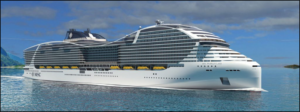CMA CGM orders 22,000 TEU capacity LNG fueled container ships
The November 13-14, 2017 UNFCCC COP23 meeting in Bonn was the stage for the world’s 3rd largest container carrier, the Marseille based CMA CGM Group, to announce its decision to fit its 9 x 22,000 TEU newbuilds scheduled for delivery in 2020, with LNG propulsion.
As such, these record breaking container vessels will be the first to operate on transoceanic routes on pure LNG. To date, the growth of LNG as a preferred fuel for vessel propulsion has been confined short and medium distance trades, primarily in the Baltic Sea, Europe and the U.S. Jones Act trades.
In taking a lead on LNG, the CMA CGM Group will exceed current and future regulations that limit the global sulphur cap on marine fuel to 0.5% effective January 1, 2020. The company is also tangibly throwing its weight behind the Paris Climate Agreement whose central objective is to strengthen the global response to the threat of climate change by keeping a global temperature rise this century well below 2 degrees Celsius above pre-industrial levels and to pursue efforts to limit the temperature increase even further to 1.5 degrees Celsius.
“We have made the bold decision to equip our future 22,000 TEUs vessels with a technology firmly focused on the protection of the environment,” said Rodolphe Saadé, CMA CGM Group CEO. “By choosing LNG, CMA CGM confirms its ambition to be a leading force in the industry in environmental protection by being a pioneer in innovative and eco-responsible technologies.”
CMA CGM has already cut its CO2 emissions per TEU in half relative to levels in 2005, in part through the introduction of efficient ultra-large vessels, and intends to cut its carbon footprint by another 30% by 2025. The use of LNG on the new builds will reduce carbon emissions by a further 25%.
LNG onboard storage capacity will be 18,600 cubic meters in a membrane containment system directly located under the wheelhouse in order not to compromise cargo intake. Construction will take place at three shipyards run by China State Shipbuilding Company (CSSC) namely: Hudong-Zhonghua Shipbuilding (Group), Shanghai Waigaoqiao Shipbuilding, and China Shipbuilding Trading Co. (CSTC).
Taking a broader perspective, the company is confident that investments in a global LNG bunkering infrastructure comprising fixed installations, trucks and barges, will accelerate the adoption of LNG as a marine fuel by others. The tangible benefits of adopting LNG are summarized as:
- up to 25% less CO2 emissions
- 99% less sulphur emissions
- 99% less fine particles
- 85% less nitrogen oxides emissions
- the Energy Efficiency Design Index (EEDI), which measures a ship’s environmental footprint, is improved by 20% compared to ships propelled by fuel oil
The new vessels will be classed by Bureau Veritas
Mediterranean Shipping Company (MSC) has confirmed its own order for 11 x 22,000 TEU newbuilds to be built at Daewoo Marine & Engineering shipyard in South Korea. Although these vessels will not be fueled by LNG, sister company MSC Cruises has signed a memorandum of understanding with STX France, finalizing the order for 2 x 200,000 GRT, LNG-powered mega cruise ships, with options for two additional vessels.

Artist’s impression of MSC 6,850 guest capacity LNG fuelled vessels
The four ships will become MSC Cruises’ World Class, which will include several innovations such as a completely new generation of LNG-powered engines as well as a new generation waste water treatment system. The vessels will feature 2,760 cabins and a maximum occupancy of 6,850 guests, the highest passenger capacity in the global cruise fleet. The initial vessels will be delivered in 2022 and 2024 – the options (if confirmed) are scheduled for 2025.
Staying with the cruise sector, Carnival Corporation currently has seven LNG fueled vessels on order following the signing of a memorandum of agreement with Meyer Werft and Meyer Turku to deliver three additional next-generation cruise ships. The company announced that two of the new LNG-powered ships are designated to Carnival Cruise Line with delivery dates expected in 2020 and 2022. The third ship will be built for P&O Cruises with delivery expected in 2020. Earlier orders were placed for the company’s AIDA Cruises and Costa Cruises brands.

